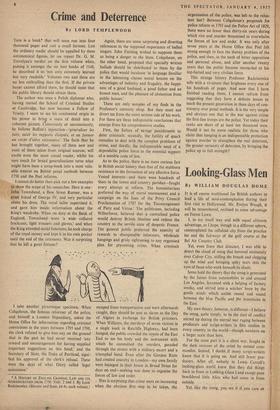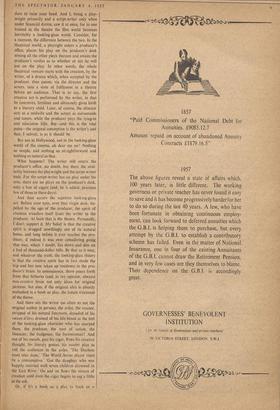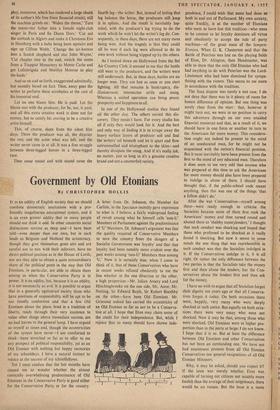Looking-Glass Men
By WILLIAM DOUGLAS HOME
Jr is of course traditional for British authors to lead a life of semi-contemplation during their first visit to Hollywood. Mr. Evelyn Waugh, it will be remembered, reclined to some advantage on Forest Lawn.
I, in my small way and with equal ultimate advantage, as I hope, though in a different sphere, contemplated the celluloid city from the practice tee and the fairways of the golf course at the Bel Air Country Club.
Yet, even from that distance, I was able to detect the cloud of smog that hovered ominously over Culver City, stifling the breath and clogging up the wind and bringing spiky tears into the eyes of those who work beneath its shade.
Some hold the theory that the smog is generated by the fumes from automobiles in and around Los Angeles, leavened with a helping of factory smoke, and stirred into a witches' brew by the gentle winds which amble round and round between the blue, Pacific and the mountains in the East.
My own theory, however, is different-1 believe the smog, quite simply, to be the dust of conflict stirred up during the eternal war raging between producers and script-writers in film studios in every country in the world—though nowhere on a larger scale than here.
For the most part it is a silent war, fought in the dark recesses of the mind by mental com- mandos. Indeed, I doubt if many script-writers know that it is going on. And still fewer pro- ducers. After all, nobody in Lewis Carroll's looking-glass world knew that they did things back to front in Looking-Glass Land except poor bewildered little Alice who had come in from outside.
Yet, like the smog, you see it if you care or dare to raise your head. And I, being a play- wright primarily and a script-writer only when under financial duress, saw it at once, for to one trained in the theatre the film world becomes inevitably a looking-glass world. Consider, for a moment, the difference between the two. In the theatrical world, a playright enters a producer's office, places his play on the producer's desk among all the other plays thereon and awaits the producer's verdict as to whether or not he will put on the play. In other words, the whole theatrical venture starts with the creation, by the writer, of a drama which, when accepted by the producer, then passes, via the director and the actors, into a state of fulfilment in a theatre before an audience. That is to say, the first creative act is performed by the writer, in that he conceives, fertilises and ultimately gives birth to a literary child. Later, of course, the director acts as a midwife and the actors as nursemaids and tutors, while the producer pays the lying-in and education bills. But—and this is the vital point—the original conception is the writer's and that, I submit, is as it should be.
But not in Hollywood, not, in the looking-glass world of the cinema, oh dear me no! Nothing so simple, and nothing so straightforward and nothing so natural as that..
What happens? The writer still enters the producer's office, no doubt, but there the simi- larity between the playwright and the script-writer ends. For the script-writer has no play under his arm, there are no plays on the producer's desk, only a box of cigars (and, be it added, precious few of those in these days).
And then occurs the supreme looking-glass act. Before your eyes, over that virgin desk, im- pelled by the ego of the producer, the spirit of creation transfers itself from the writer to the producer. At least that is the theory. Personally, I don't support it. My belief is that the creative spirit is dragged unwillingly out of its natural home, and long before it ever reaches the pro- ducer, if indeed it was ever considering goidg that way, which I doubt, lies down and dies on a bed of thousand-dollar hills. Be that as it may. and whatever the truth, the looking-glass theory is that the creative spirit has in fact made the trip and has now taken up residence in the pro- ducer's brain, In consequence, there pours forth from that hitherto (and, in my opinion, always) non-creative brain not only ideas for original pictures, but also, if the original idea is already embodied in a book or play, the future treatment of the theme.
And there sits the writer (as often as not the Original author in person), the artist, the creator, stripped of his natural functions, denuded of his raison d'etre, drained of his life-blood at the feet of the looking-glass character who has usurped them, the producer, the man of action, the financier, the budgeteer, the businessman! And out of his mouth, past his cigar, flows his creative thought, his literary genius, his master plan to roll the audiences in the aisles. 'The Duchess must take dope,' The World.Series player must he a consumptive,' Get the daughter who was happily married with seven children drowned in the East River.' On and on flows the stream of creation until even the cigar begins to sag a little at the ash.
Or, if it's a book or a play (a book or a play, moreover, which has rendered a large chunk of its author's life free from financial strain), still the machine grinds on : 'Widen the theme,' Turn the tennis-star father into a female night-club singer in Paris and fix Diana Dors,"Cut out the ambush in Algiers and make it Christmas Eve in Hamburg with a baby being born upstairs and sign up Clifton Webb,' Change the air-hostess into a Scotch shepherd and star John Wayne,' 'Cut chapter two to the end, switch the scene from a Trappist Monastery to Monte Carlo and get Lollobrigida and Marilyn Monroe to play the leads.'
And so on and so forth, exaggerated admittedly, but soundly based on fact. Then, away goes the writer to perform these acrobatics at the cost of his immortal soul.
Let no one blame him. He is paid. Let the blame rest with the producer, for he, too, is paid, and all this extra creative work is done not for money, but to satisfy his craving to be a creative artist himself.
This, of course, dates from the silent film days. There the producer was all, the director the rest, and the actor what was left, and the writer never came in at all. It was a free struggle between three-legged horses in a three-legged race.
Then came sound and with sound came the fourth leg--the writer. But, instead of letting that leg balance the horse, the producers still keep it in splints. And the result is inevitably lop- sided, with the producer's leg trying to do the work which he won't let the writer's leg do. Con- sequently, in these days, there are not many races being won. And the tragedy is that they could all be won if each leg were allowed to do its own work without being tripped up by the others.
As I looked down on Hollywood from the Bel Air Country Club, it seemed to me that the battle still went to the producers, and the writers were still underneath. But, in these days, battles are no longer won. They are lost as soon as you start fighting. All that remains is bankruptcy, dis- illusionment, internecine strife and smog. Whereas a united operation can bring peace, prosperity and happiness to all In one of the Hollywood studios they found oil the other day. The others envied this dis- covery. They needn't have. For every studio has oil if only they would look for it. And the best and only way of finding it is to scrape away the heavy surface layers of producer soil and find the writers' oil beneath and let it spurt and flow untrammelled and triumphant to the skies—and thereby dissipate the smog. And if it's really ink, no matter, just so long as it's a genuine creative brand and not a counterfeit variety.
















































 Previous page
Previous page